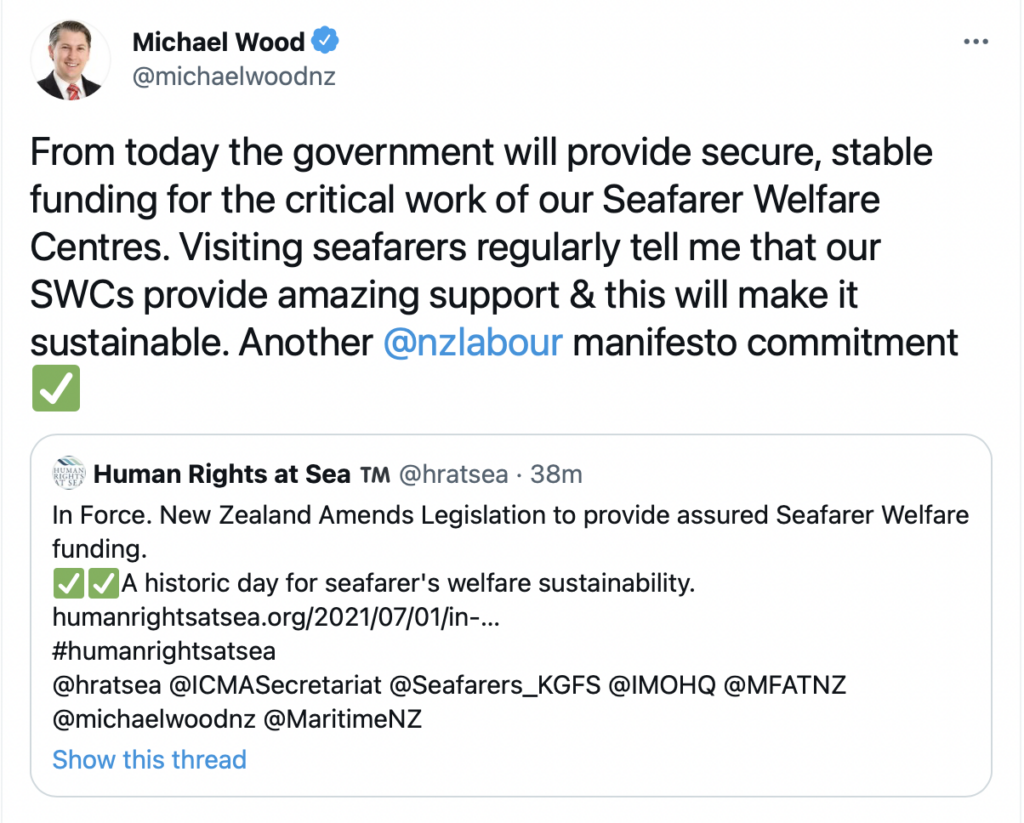Effective from 1st July, the New Zealand government has updated its Maritime Transport Act 1994 to allow maritime levies to fund seafarer welfare services for the purposes of the MLC.
The move reflects the effective lobbying undertaken by the New Zealand Seafarer’s Welfare Board with the supporting independent report into failures to financially support seafarers and their welfare services by Human Rights at Sea (HRAS) issued in April 2020 with attached Counsel’s opinion.

Arguably a historic day today for seafarer’s welfare assurance; on the occasion, Mr. David Hammond, Founder & CEO at HRAS, commented on his Linkedin account:
Once again, incredibly proud of my team for the successful support to the New Zealand Seafarer’s Welfare Board in amending legislation to address long-term seafarer welfare support to visiting crew in force as of today, 1 July 2021. This means that circa 130,000 seafarers per year (COVID aside) visiting one of the 10 ports in NZ will receive improved welfare services financially supported by the maritime levy.
”This should also set an international precedent for other coastal states to follow. It further proves the value and effect of Human Rights at Sea (HRAS) independent reports to positively affect social, policy and legislative change for good.” Mr. Hammond also said.
[smlsubform prepend=”GET THE SAFETY4SEA IN YOUR INBOX!” showname=false emailtxt=”” emailholder=”Enter your email address” showsubmit=true submittxt=”Submit” jsthanks=false thankyou=”Thank you for subscribing to our mailing list”]
The Regulatory Systems (Transport) Amendment Act 2021 (30 March 2021) comes into force with the key amendment to Section 191 amended (Maritime levies) which crucially states “After section 191(2)(b), insert: (c) the facilitation of, or support for, seafarer welfare services.” This updates Part 14 General provisions relating to shipping.
To remind, the commissioned HRAS report ‘New Zealand: Under-Funding of Seafarers’ Welfare Services and Poor MLC Compliance‘ was issued on 16 April 2020 with five key recommendations:
- Recommend that the New Zealand Government immediately review the funding mechanism, or lack thereof, for shore-based seafarers’ welfare facilities and services under the MLC throughout the State;
- Recommend that the New Zealand Government draft and propose relevant amendments to national legislation to support seafarer’s welfare services, for example to the Maritime Transport Act 1994 in order to give effect to Regulation 4.4 of the MLC;
- Recommend that the New Zealand Government introduce an updated compulsory port levy system in line with that advocated by the ITF ICC, and other maritime welfare organisations, which specifically focus on sustainably delivering seafarers’ welfare services;
- In the alternative, it is recommended that the New Zealand Government ring fence and allocate part of the current Maritime Levy currently in place to assure future funding and the protection of seafarer’s welfare facilities and services;
- Recommend that the SWB raise a formal complaint with the ILO for non-compliance with a Convention obligation should the New Zealand Government fail to subsequently act.”
In May 2020, Maritime New Zealand designated seafarer welfare representatives as ‘essential workers’ and provided clear advice for port welfare service providers in terms of their role, available support and the access that they can gain to seafarers.
In October 2020, the New Zealand Government announced that it intended to amend the Maritime Transport Act 1994 to enable the existing maritime levy to fund the services required for seafarers’ wellbeing.
Prior to the passing of the Bill, Maritime levies under section 191 of the Maritime Transport Act were used for a wide range of shipping-related and regulatory purposes, but those purposes did not include seafarer welfare services.
On 20 April 2020, Minister Wood confirmed to HRAS that: “The Government has made changes to the MTA which will remedy the situation and allow maritime levies to fund seafarer welfare services for the purposes of the MLC. This will be effective from 1 July 2021.”
Following an information disclosure request to Maritime New Zealand, on 24 June figures obtained by HRAS highlighted that the legislative amendment will affect 10 ports and annual visiting crew numbers, which have varied between a high 163,608 in 2019 to a low of 82,103 (until March 2020) with an average over the past four years of 129,150.
In the future, New Zealand Seafarer welfare support services will be financially reinforced with every seafarer who visits the country being able to benefit from the investment into their working lives.
The hard work undertaken by the New Zealand Seafarer’s Welfare Board has set a precedent that can now be mirrored by coastal states around the world to benefit all seafarers going forward. Human Rights at Sea is pleased to have been able to support this change
…CEO, David Hammond, also commented.

































































